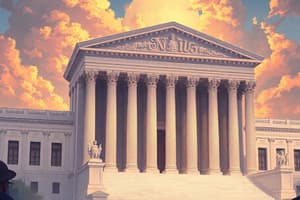Podcast
Questions and Answers
What is the difference between statutory standing and prudential standing?
What is the difference between statutory standing and prudential standing?
- Statutory standing involves specific statutes, while prudential standing is based on prudent judicial administration. (correct)
- Statutory standing is related to the stage of litigation, while prudential standing depends on the defendant's motion.
- Statutory standing can only be established at trial, while prudential standing is determined during summary judgment.
- Statutory standing is based on prudent judicial administration, while prudential standing involves specific statutes.
In what situation does prudential standing come into play?
In what situation does prudential standing come into play?
- When a defendant moves to dismiss a complaint
- When the plaintiff plausibly alleges Article III standing
- During trial or summary judgment
- When the court favors resolution of a dispute (correct)
At what stage of litigation does the question of plausibly alleged Article III standing arise?
At what stage of litigation does the question of plausibly alleged Article III standing arise?
- Appeal
- Summary judgment
- Trial
- Motion to dismiss (correct)
What determines whether a plaintiff has actually established the elements of Article III standing?
What determines whether a plaintiff has actually established the elements of Article III standing?
What is the term used to describe the power of unelected federal judges to strike down statutes enacted by elected representatives?
What is the term used to describe the power of unelected federal judges to strike down statutes enacted by elected representatives?
How may the same facts give rise to different standing analyses?
How may the same facts give rise to different standing analyses?
What is the key consideration in determining whether a plaintiff has plausibly alleged Article III standing?
What is the key consideration in determining whether a plaintiff has plausibly alleged Article III standing?
Which branch of government has the power to limit the jurisdiction of federal courts as a check on their power?
Which branch of government has the power to limit the jurisdiction of federal courts as a check on their power?
What is the primary purpose of justiciability doctrines in relation to the federal courts?
What is the primary purpose of justiciability doctrines in relation to the federal courts?
Which doctrine is considered the most important and widespread among those stemming from the case-or-controversy requirement?
Which doctrine is considered the most important and widespread among those stemming from the case-or-controversy requirement?
What principle does the Supreme Court consider fundamental to the judiciary's proper role in the system of government?
What principle does the Supreme Court consider fundamental to the judiciary's proper role in the system of government?
How does Article III constrain federal courts in the exercise of their power?
How does Article III constrain federal courts in the exercise of their power?
What are the three elements a plaintiff must satisfy for a lawsuit to have Article III standing?
What are the three elements a plaintiff must satisfy for a lawsuit to have Article III standing?
What is the first sub-query related to the injury-in-fact requirement?
What is the first sub-query related to the injury-in-fact requirement?
Which of the following is NOT a requirement for Article III standing?
Which of the following is NOT a requirement for Article III standing?
Why is it often more difficult to satisfy the injury-in-fact requirement when the claim arises from a right protecting broad classes of the public?
Why is it often more difficult to satisfy the injury-in-fact requirement when the claim arises from a right protecting broad classes of the public?
What does redressability refer to in the context of Article III standing?
What does redressability refer to in the context of Article III standing?
What does the causation requirement for Article III standing focus on?
What does the causation requirement for Article III standing focus on?
Why do states have standing to sue the federal government in certain instances?
Why do states have standing to sue the federal government in certain instances?
When can taxpayers have standing to challenge government expenditures?
When can taxpayers have standing to challenge government expenditures?
Who enforces Article III standing requirements in court proceedings?
Who enforces Article III standing requirements in court proceedings?
Why are all three elements of Article III standing considered jurisdictional?
Why are all three elements of Article III standing considered jurisdictional?
Flashcards are hidden until you start studying




